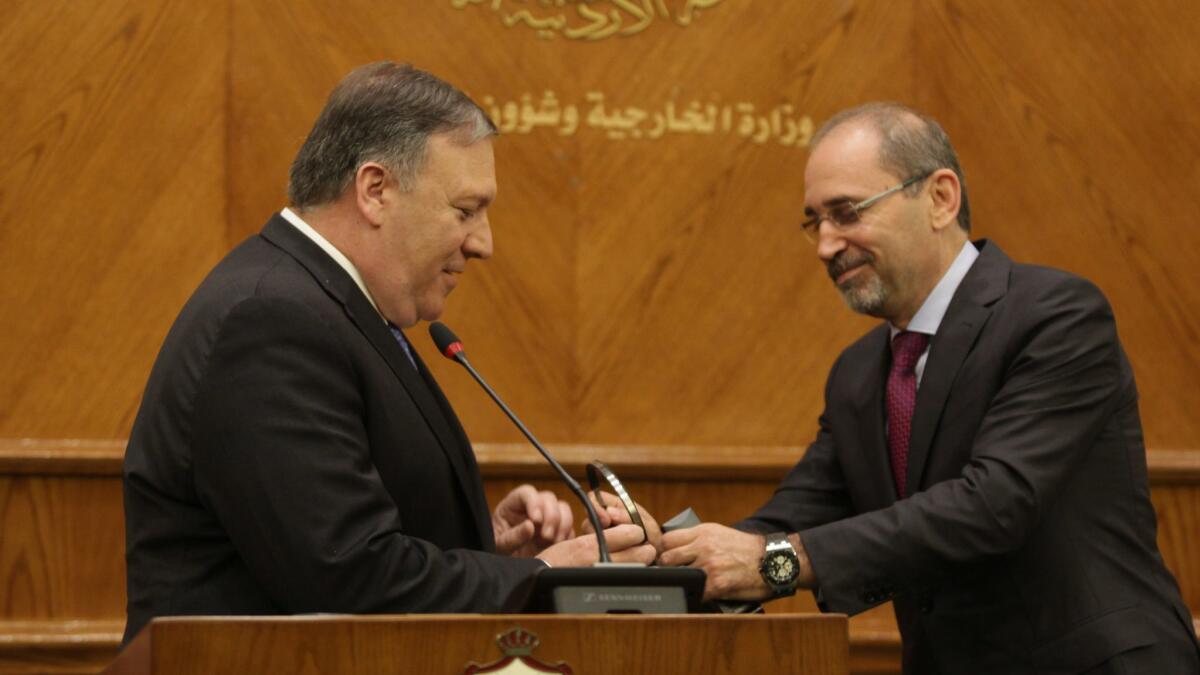Secretary of State Pompeo urges Palestinians to return to peace dialogue with Israel, says U.S. ‘open to’ two-state solution

- Share via
Reporting from Amman, Jordan — Secretary of State Mike Pompeo finished his whirlwind Middle East tour Monday with an emphasis on peacemaking efforts in the region.
Pompeo urged Palestinians to reengage in stalled talks seeking peace with Israel and called for a political resolution to the fighting in Syria, even as he excoriated Iran for what he described as its “malign influence” and activity in the area.
His comments came during a news conference in the Jordanian capital, Amman, after a meeting with Ayman Safadi, Jordan’s foreign minister.
“We’re going to make progress on these key regional issues, and we will move forward to ensure a stable and safe Middle East,” Pompeo said.
Although he had not met with Palestinian officials during his multiday visit to the region, Pompeo urged that they return to “political dialogue” and insisted a resolution to the long-standing conflict with Israel was “an incredible priority” for the U.S.
“We’re certainly open to a [two-state] solution as a likely outcome,” said Pompeo.
He did not criticize Israel’s use of deadly force in dealing with mass protests near the Gaza border in recent weeks, where Israeli troops shot and killed 45 Palestinians and wounded thousands.
“We believe the Israelis have the right to defend themselves, and we’re fully supportive of that,” he said.
Pompeo, who served as CIA director before becoming secretary of State last week, said the U.S. had not taken a position “on boundaries or borders,” which he said would remain subject to negotiation.
In his introductory remarks, Safadi spoke of discussions between the U.S. and Jordan to “try to resolve many of the conflicts and crises that have denied peoples of the region the peace and stability and opportunity that they deserve.”
“Key to that, you know for us in Jordan,” he said, “is the Palestinian-Israeli conflict.”
The two-state solution to help bring peace between Israelis and Palestinians is “being challenged,” said Safadi, but there is no other “viable alternative that we can sustain.”
Pompeo hailed a joint U.S., Russian and Jordanian de-escalation in southern Syria. The deal, which became effective in late 2017, set a cease-fire over southwestern Syria, where opposition rebels remain entrenched in areas near the Jordanian and Israeli borders.
Loyalist troops had sought to dislodge them, raising alarm in both Jordan and Israel regarding the presence of Iranian-backed militias near their territory.
Pompeo added that the U.S. and Jordan were “in perfect accord with respect to how to proceed with the objectives” in Syria.
“It is a Geneva-based process led by the U.N. to achieve a political resolution to continue to de-escalate the conflict so that we can begin to resolve all of the various political challenges that are faced there,” said Pompeo, referring to the years-long U.N.-brokered peace talks between the Syrian government and its adversaries.
Pompeo’s visit comes a few months after then-Secretary of State Rex Tillerson had visited the kingdom to sign a memorandum of understanding that guaranteed Jordan at least $6.27 billion over the next five years, as well as additional funds to deal with the influx of Syrian refugees.
“Support for Jordan’s security and stability is an important national interest of the United States,” Pompeo said. “We want the Jordanian people to know this.”
He also touched on what has been the primary thrust of his first international trip as secretary of State: countering Iran’s malign influence and activities in the region.
Iran has dispatched tens of thousands of fighters to bolster the troops of Syrian President Bashar Assad, while Western and regional leaders have warned that the Islamic Republic aims to establish a “land corridor” linking Tehran to Beirut through Iraq and Syria.
The escalating rhetoric against Iran came one day after a suspected Israeli missile strike on a number of bases in Syria were reported to have killed many pro-government fighters.
The state-run Syrian Arab News Agency quoted an unidentified military source Monday who said facilities in the provinces of Aleppo and Hama were struck in a “new aggression” overnight.
The source did not mention any casualties, but the Syrian Observatory for Human Rights, a pro-opposition group based in Britain, said the missiles had struck an arms depot at Brigade 47, a base south of Hama province, killing 26 fighters. It added that the death toll could rise.
The semiofficial Iranian Students News Agency, citing local activists and sources, said 18 Iranians were killed in the attack. The report was later withdrawn, and Tasnim, a news agency affiliated with Iran’s Islamic Revolutionary Guard Corps, denied any casualties.
Bulos is a special correspondent.
Twitter: @nabihbulos
UPDATES:
1:30 p.m.: This article was updated with additional comments and casualty reports.
This article was originally published at 7:35 a.m.
More to Read
Sign up for Essential California
The most important California stories and recommendations in your inbox every morning.
You may occasionally receive promotional content from the Los Angeles Times.














